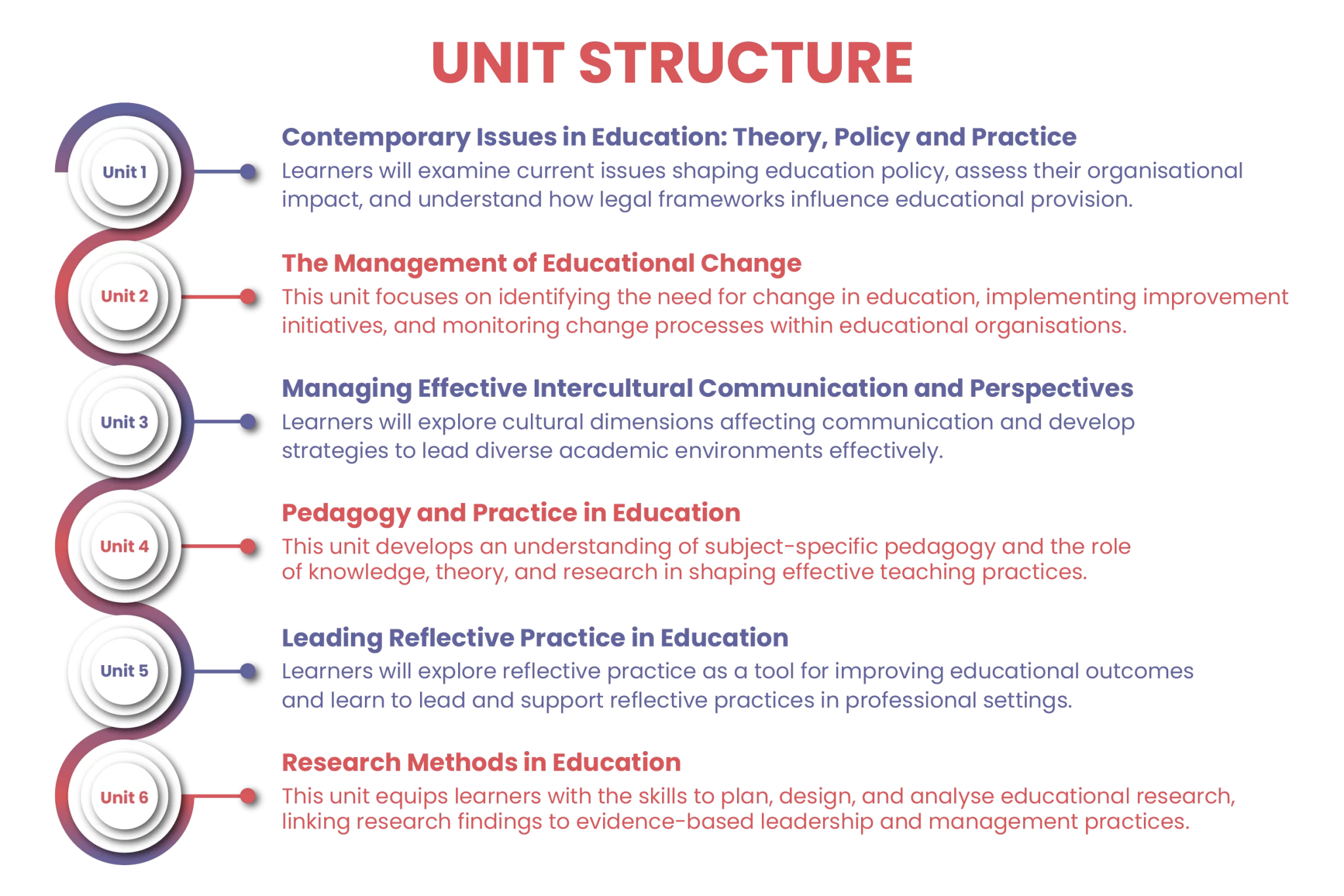Leadership in the education sector refer to the roles of principals, heads of departments and senior managers that go beyond the management of daily operations to fostering an effective teaching and learning environment for all. It drives improvements at the institutional level, navigates policy changes and fosters a culture of continuous learning.
Key Takeaways:
- Educational leadership today requires strategic thinking to manage change, resources, and innovation effectively.
- The OTHM Level 7 Diploma in Strategic Management and Leadership equips professionals with skills to lead, plan, and drive improvements in education.
- This qualification offers strong academic and career progression in the UK and international education sectors as well.
Effective educational leadership requires a strategic mindset and the ability to lead with clarity and purpose. The education sector demands leaders who think critically, manage change efficiently, and contribute to an organisation’s long-term success.
The OTHM Level 7 Diploma in Strategic Management and Leadership (RQF) addresses this demand by equipping aspiring and current leaders with the advanced skills needed to lead with clarity, confidence, and competence in complex educational environments.
In this blog, we will explore the value of the OTHM Level 7 Diploma in Strategic Management and Leadership (RQF) qualification.

Understanding the OTHM Level 7 Diploma in Education Management and Leadership (RQF)
The OTHM Level 7 Diploma in Education Management and Leadership (RQF) is a postgraduate qualification tailored for professionals who want to take on leadership and management roles within the education sector. It provides a base for the leading reflective practices, to cope with the changes, influence educational policies, and assist in the development of institutions.
This OTHM Level 7 Diploma follows the industry standards across the UK and is regulated by Ofqual (Office of Qualifications and Examinations Regulation). It is also recognised internationally, making it a valuable investment in your professional career and academic progression.
Why Leadership and Management in Education Need Strategic Skills?
Strategic skills are essential to leading and managing a modern educational system. They address challenges and possible solutions, manage resources, and set long-term goals while enhancing performance. A skilful leader and manager inspires institutions to work towards shared objectives and achieve their goals.
Evolving Educational Challenges
The education sector is constantly evolving under the influence of legislative changes, digital innovation, restrictive funding, and learners’ demands. Leaders who are equipped with strategic skills can navigate the changes in the education industry. They face the challenges of a complex and rapidly evolving environment with a proactive approach, resulting in innovation and stability in the sector.
Align Vision with Organisational Goals
Educational leadership requires having a clear vision that complements the long-term measurable goals of the organisation. With strategic skills, leaders make sure to instigate educators and learners and encourage them to work collectively to achieve the goal.
Drive Changes
Leaders are essential to drive change in an institute; from implementing new technologies to using diverse teaching methods, leaders assist in improvements. Strategic leaders lead the change and ensure that everyone in an organisation or institution is satisfied.
Manage Resources
To effectively manage the resources and deployment of digital tools and learning materials is important for an educational leader. With the help of strategic planning, leaders allocate budgets and resources while providing financial and operational stability.
Ensure Accountability
Educational leaders and managers ensure accountability by providing clear expectations and performance reviews while complying with regulatory standards. They promote accountability and transparency by monitoring the work channel and reporting it in a timely manner.
Promote Innovation
The purpose of education is to prepare learners for the future world. Educational institute leaders and managers promote innovation through the professional development of educators. They are always ready to adopt new ideas that ensure their organisation remains relevant while strengthening its reputation.
How to start OTHM Level 7 Diploma of Leadership and Management in the Education Sector?
To begin this qualification, certain entry requirements must be met. These are outlined below:
Where English is not the first language, a recognised English language proficiency certificate must be submitted.
Key Modules
The following are the mandatory six units included in the OTHM Level 7 Education Management and Leadership diploma. The units and their learning outcomes are as follows.

Career Opportunities for Education Professionals
The OTHM’s Level 7 Diploma in Education Management and Leadership provides professional leadership and strategic skills that address the complex demands of the modern education system. This qualification is best suited for professionals currently working or with substantial experience.
Key Roles Supported by the Qualification
Graduates of this diploma are well-prepared to take on senior and strategic roles such as:
| Job Roles | Responsibilities |
|---|---|
| Headteacher or Principal | Strategic planning, staff management, curriculum oversight, and institutional improvement. |
| Director | Oversee schools and departments. |
| Education Manager or School Improvement Lead | |
| UDrive better performance, innovation and quality standards. | Strategic Analyst and Policy Maker |
| Curriculum Development Manager | Design and manage effective learning frameworks. |
| Senior Management Consultant | Advise education bodies on leadership, change management, and performance enhancement. |
| Education Consultant or Career Advisor | Providing guidance on teaching practices, professional development, or learner progression. |
Employment Sectors and Settingss
The following are the sectors or settings where professionals may find career opportunities.

What are the Progression Routes after the Level 7 Diploma?
The Level 7 OTHM diploma provides both academic and career progression opportunities. This is a valuable qualification that offers a pathway to further academic progression through university top-up programmes while also advancing their careers in various educational settings.
Academic Progression
This OTHM Level 7 Diploma is positioned at Level 7 on the Regulated Qualifications Framework (RQF), aligning it with the academic level of a Master’s degree in the UK. Learners can further advance to the following routes:
Professional Development
This Level 7 Diploma enhances strategic and leadership skills that support career advancements in multiple professional roles.
This dual focus on academic and professional progression ensures that this qualification not only builds advanced knowledge but also directly supports career advancement across diverse educational and leadership contexts.
Conclusion?
In an evolving educational landscape, there is always a need for leaders who can think strategically and act decisively. The OTHM Level 7 Diploma in Education Management and Leadership (RQF) provides vision to professionals with the advanced knowledge and leadership capabilities required to guide institutions through change, improve learning outcomes, and manage resources effectively. This Level 7 Diploma prepares individuals to lead with confidence across a range of educational settings with its focus on practical leadership, policy understanding, and organisational strategy. Whether advancing in your current role or transitioning into senior leadership, the diploma provides a strong foundation for professional growth and academic progression.






